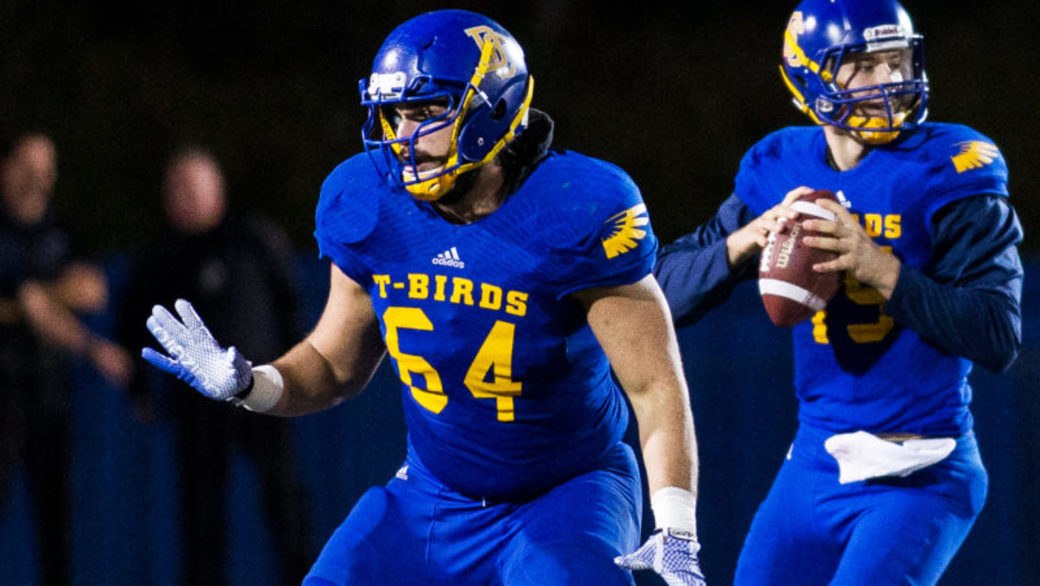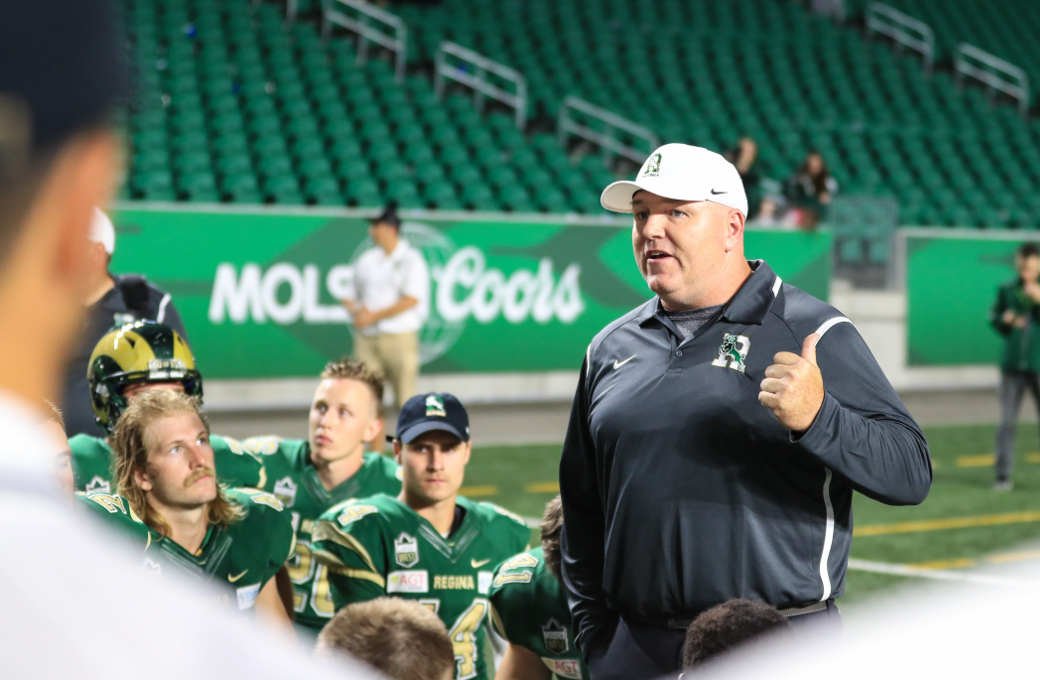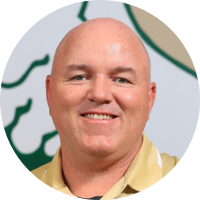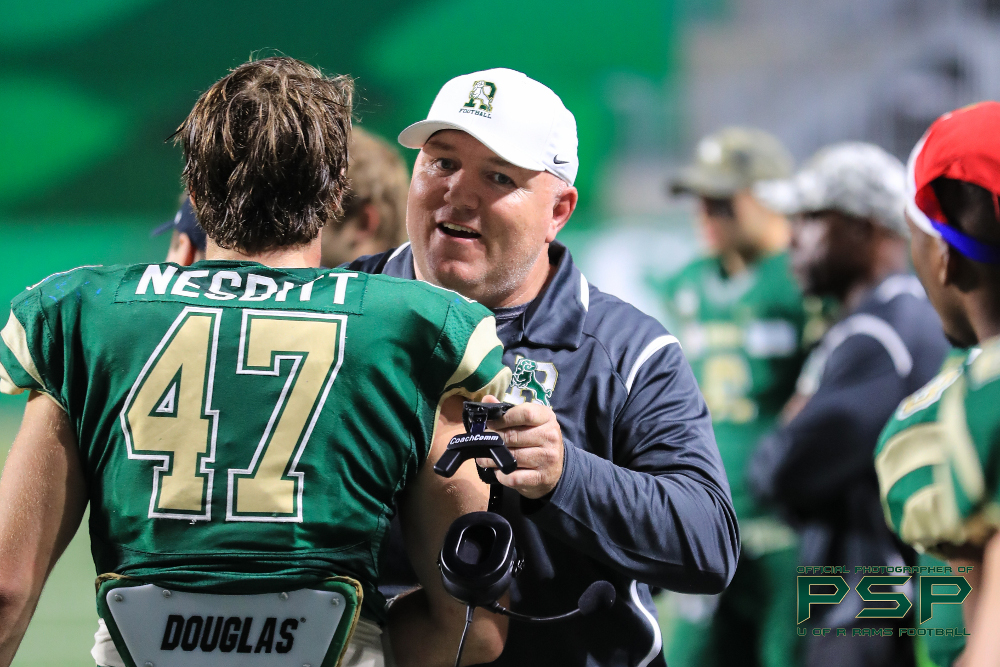Men’s Football
CFL Scouting Bureau: 13 U SPORTS standouts make final top 20 prospect list for 2018 draft


U SPORTS Staff

Throughout the 2017-18 season, U SPORTS sits down with one key athlete, coach, and staff member of each U SPORTS athletic program in our new interview series “Getting to know…”
 Name: Steve Bryce
Name: Steve Bryce
School: Regina
Sport: Football
Position: Head coach
Seniority: Two seasons
Previous school/position: Head coach at Etiwanda High School
Hometown: Regina, Sask.
I first got involved in coaching when I was a player for the Regina Rams when they were a junior football team. I was a position coach at Riffel, my old high school. I did that for a couple seasons and then I went to Jamestown College and played four seasons there, then helped out as a graduate assistant after that. I really enjoyed the time coaching and working with athletes.
When I graduated I thought I was going to go into teaching and I wanted to coach as well, so I got a job opportunity in southern California and I was an assistant coach down there for eight years. Then the head coach position opened up and I applied for it and got that position and then I was the head coach for seven years there. Then we decided to move the family back to Regina and when we did, about a year after that, the position here opened up with the Regina Rams. I was coaching minor football here with a bantam team and with the selects program out of Moose Jaw, Sask., that plays down in Texas and Florida. So I interviewed for this position and got it. That was kind of my path in a nutshell.
My former coaches – here, it would have been Jerry Orban. He was an outstanding mentor and role model. Frank McCrystal was the head coach and then I left here and I went to Jamestown. Joel Swisher was the head coach there and he was a great role model too, he is a former Marine drill sergeant, he was very much into to discipline. I learned a lot from him and even working with some of the people that I worked with in California. Tom Dineley, he was a good mentor for me, as I was an assistant coach down there before I took over as the head coach. Then I spent a lot of time going to coaching clinics, listening to Pete Carroll, Chris Ault, Mike Leach. Going to listen to them speak at the University of Southern California all-sports clinic or the Glazier clinic or Jerry Stovall’s clinic. I spent a lot of time going to clinics, trying to soak up as much football knowledge as I could.
I think I’m different as a position coach then I am as a head coach. You have to look at everything from a head coaching perspective and I try to be as organized as possible, I try to be as consistent as possible, I try to be personable, I want the players to know me and I need to know the players. From that aspect I would be a players’ coach because I’m not distant, my door is always open. I like to think of myself as their advocate and someone who helps facilitate their growth and development as not only a football player but as a man, as a person.
I would have to say Pete Carroll. Just because I’ve had the chance to talk to him and then hear him talk and he invited us to their offensive and defensive meetings, for years. So I really got to know his style and character and his intensity. What really inspired me about him is, you just want to play for the guy when you're there. Mike Leach is kind of a strategist, I like listening to him, I like learning from him because he’s a very deep thinker and as far as the chess match of football goes I don't think there is too many brighter than Mike Leach. So I would have to say, probably those two.
I volunteered to do a dunk contest, like where you get dunked in the water, and stuff like that to remove inhibitions of fear from players. You try to be as creative as possibly can and you try to always change what you're doing but I’m not sure about out-of-the-box. I’ve coached very different styles of offences. I spent seven years coaching Wing-T, two years in a Pro-I and the rest in the spread and so I would always try new things. My next evolution in California was to learn more about the pistol offence, then we decided to move up here so now it’s a Canadian style of offence, which is an amalgamation of a lot of those things.
If you look at the big picture as a coach, I think you have to take wins and losses out of it. Because a lot of people will look and say “Hey, this is a winning coach here or that coach has a great record,” and I think real coaches don’t do this for a record. They don't do it for wins and losses and the paper or a column or a blog.
I think really good coaches do what they do because it’s an opportunity to help shape men from young men or boys/adolescents. It’s when they come back 10, or 15 years later and then they tell you about the impact that you've had personally on their life – that you were there for them, when you didn't even know you were there for them. When they would come in and tell you a story and nobody else in their life had time to listen to them and they've become successful men and great people in the community, that’s when I know I've succeeded, that’s when I know the time was worth while when I get the feedback 15 or 20 years down the road, that I left a positive imprint on someone.

Don’t read your press clippings. Don’t ever think you've arrived. Always remember the hunger that you had when you were striving to reach some level of success or some measure of accomplishment.
For parents, be hands off and let kids be kids, and let them experience things and especially let them fail. Because if you don’t ever let a kid fail, they’ve become maladjusted and can’t deal with adversity later in life. I think, way too often, you get parents that are entitling and enabling and making excuses for their kids in elementary school, on football teams saying they're sick or missing practice. Whatever the excuse may be, let them fail, let them be held accountable and they'll grow into much better people if they do.
When I first took over as a head coach I was very much a disciplinarian. Here was my rule, here’s my line: You cross it, you're done. Like there was no two ways around it.
What I learned though in my first couple years – because I was also involved in doing some home visits with athletes especially when they transfer from one school to another, our athletic director and myself – we would be required to by our governing body to do a home visit, to make sure that they live in your area. And I learned some very valuable lessons when I did that – I learned that every athlete, has been dealt a different hand. We would have students in our team that would show up with a nicer car than our principal drove. And on that same team, in the same locker room, is a kid who doesn't have a bed, has about three different shirts total and has no idea where their next meal is coming from. So we can be as rigid and stringent as we want, with our rules, but you have to remember these rules are applicable to young men and each one of those young men comes from a very different background, and very different set of circumstances.
If our goal is to make them better men, you can’t just close the door on one kid just because he doesn't have the same means as another kid. So you have to take those things into consideration. When you're making your rules, if it’s a rule that it’s a hill you're willing to die on, if it’s something that important to you, also be aware that there are some kids who may or may not be able to meet that standard because of circumstances that they have no control over.
The principals and values that I have that have remained the same is that I always keep in mind why I am here. What the job of a coach is to do, and that’s to develop young men. Of course there is offence, defence, special teams, there’s strength and conditioning, nutrition, keeping them academically eligible, all of those things but I think we take on the mantle and wear a lot of hats on that mantle as a role model, as a dad, coach, teacher, professor. We proofread papers of the players. We do a lot for them and our goal because we do those things is to try to help them on their journey, is to leave that lasting impression that this hard work can benefit other people and help you become a better person.
I’ve got two little girls, so when I don't have my coach’s hat on, I have my daddy’s hat on. That now has become the most important job of my life and I definitely don’t want to fail at that job.
There have been situations where I’ve been wrong, it’s also taught me some valuable lessons when you're wrong and you just have to be a big enough person. I’ll rip a player in the game situation at halftime for something that I thought they did and then I’ll watch it back on film and I was completely wrong.
The thing that that’s taught me is, nothing in the game is ever as good, or bad as you think it is at the time – you have to watch it on film before you really get an earnest reaction to it. So don’t pat anybody on the back too hard or kick em’ in the butt too hard cause it’s not quite that good or quite that bad.
Men’s Football
U SPORTS Staff
